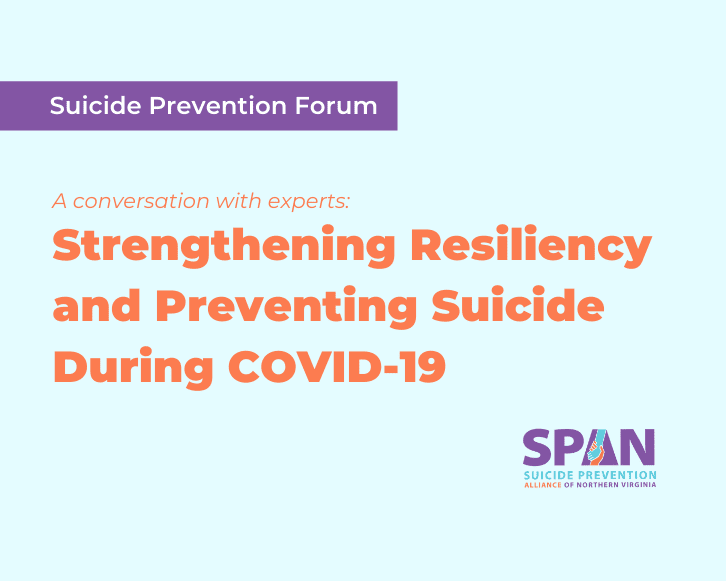Building Resilience and Preventing Suicide During the COVID-19 Pandemic
By: Northern Virginia Health FoundationThe COVID-19 pandemic’s economic and health impacts have propelled public discussions on equity, isolation, mental health, and the importance of suicide prevention.In recognition of Suicide Prevention Month and Older Virginians Mental Health Month, the Suicide Prevention Alliance of Northern Virginia (SPAN) hosted a virtual event to learn about what we can all do to strengthen emotional wellbeing during these unprecedented times. The Honorable Jane Woods, Chair of the Board of the Northern Virginia Health Foundation moderated a conversation with Dr. Ramfis Marquez, Behavioral Health Director of the Greater Prince William Health Center, and Dr. Stacey Hardy-Chandler, the Director of the Center for Families and Children in the Alexandria Department of Community and Human Services.
Practical strategies to help increase resilience
Drs. Hardy-Chandler and Marquez both noted that learning to cope with stress in a healthy way can help make us, the people we care about, and the community stronger. During their conversation, they outlined several practical strategies that help do this. Here are some of them:
Build a sense of community. After the outbreak, many people lost some of the normal ways they connected with friends and family. During these times, we need to recreate ourselves and build community in other ways, says Dr. Marquez. That can mean playing trivia or fun games with family members online or exercising with friends on Zoom. These activities are more than just fun things to do, he says. They create some of the same hormones that typically help stabilize our mood or make us feel love or happiness.
Uphold a routine or ritual in your day. There’s so much that’s uncertain, that it’s important to find things in our day that we can control, says Dr. Hardy-Chandler. Routines give us structure and help us plan. Drinking a cup of coffee in the morning, taking regular breaks from listening to the news, or eating meals at set times are routines that we make sure show up in our days regardless of how our regular routines have changed.
Use past skills, tools and resources. Coping with stress doesn’t always require a new strategy. Even before the pandemic, many people instituted healthy stress-relieving strategies to help them manage their anxiety. Activities like texting a friend, counting to 10, eating well-balanced meals, or journaling. If they worked before, they can be just as effective now, say Dr. Hardy-Chandler.
Be open to professional help. Therapists, counselors, and other mental health professionals can help us navigate through some of those obstacles we might face in dark times. If you or someone you know are in crisis or need immediate help, please call the National Suicide Prevention Lifeline at 1-800-273-TALK (8255) for 24/7, free and confidential support, prevention and crisis resources for you or your loved ones.
If you are in a life-threatening situation, please call 9-1-1
If you use TTY, please dial 7-1-1
Slides and resources from the SPAN Forum Strengthening Resiliency and Preventing Suicide During the COVID-19 Pandemic are available at https://www.suicidepreventionnva.org/.

